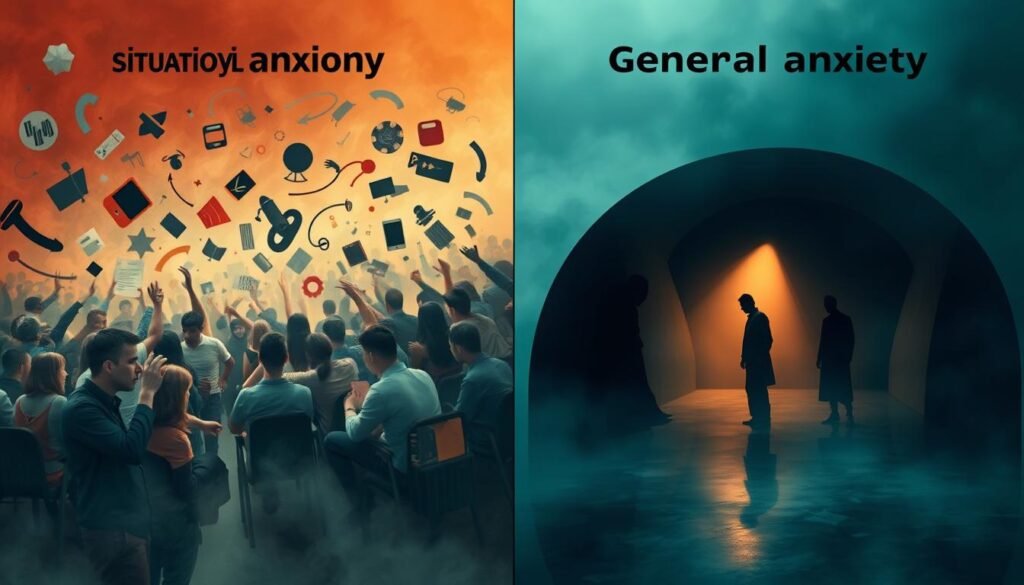About 31.1% of U.S. adults will face an anxiety disorder at some point. This shows how common situational anxiety is. It appears in particular situations like speaking in public or being in social gatherings. Luckily, there are effective ways to cope with situational anxiety. These methods help people handle tough moments better.
Life throws stressful situations our way often. It’s vital to know how to deal with the stress and worry they bring. Our aim is to share useful tips for managing anxiety. These tips can make day-to-day challenges less daunting. Techniques like deep breathing or enjoying music can calm the mind. They can make life more enjoyable. For more details on these techniques, check out this useful guide.
Key Takeaways
- Situational anxiety affects a significant percentage of adults in the U.S.
- Effective coping strategies can dramatically improve anxiety management.
- Targeted techniques such as breathing exercises and physical activities provide immediate relief.
- Regular mindfulness practices can reduce anxiety symptoms considerably over time.
- Social support networks play a vital role in managing situational anxiety effectively.
Understanding Situational Anxiety
Situational anxiety happens when specific events make someone feel scared or nervous. For example, speaking in public, taking tests, or meeting new people can cause these feelings. This type of anxiety is usual and only happens in certain situations. Knowing more about it can help people deal with their feelings better.
Definition of Situational Anxiety
This anxiety comes and goes and doesn’t usually stop someone from doing their daily tasks. But, it can make someone feel really worried for a short time. It can make someone’s heart beat fast or their muscles feel tight. This is because their body is reacting to stress. People might worry a lot, find it hard to focus, or have too many thoughts at once. Even though situational anxiety is common, it’s important to understand what it is.
Common Situations That Trigger Anxiety
Knowing what causes situational anxiety can help people recognize when they might feel it. Here are some common causes:
- Social interactions: About 40% of young people feel anxious in situations like meeting new coworkers or going on first dates.
- Academic pressure: Around 60% of students get anxious at the start of a new school term, worrying about new teachers and classmates.
- Tests and exams: About 30% of people feel anxious during tests, which can make them freeze up or breathe fast.
- Public speaking: Nearly 25% of people feel nervous about speaking in front of others, which can make talking hard.
- Travel: Around 20% of adults are scared of flying, especially if there’s turbulence.
Recognizing the Symptoms of Situational Anxiety
Understanding the symptoms of situational anxiety is crucial for everyone. These symptoms show up in physical, emotional, and mental ways, impacting how we function every day. Knowing these signs helps us find ways to cope and get the right support when needed.
Physical Symptoms
Physical symptoms of situational anxiety often include:
- Increased heart rate
- Excessive sweating
- Trembling or shaking
- Nausea or upset stomach
- Dizziness or light-headedness
- Headaches
These symptoms are tough to deal with and can mess up how we do in stressful times.
Emotional Symptoms
Emotional symptoms are key too. You might feel:
- Intense feelings of dread
- Increased irritability
- Panic attacks
- Feelings of helplessness
Emotional symptoms can change in how strong they are. They often connect to certain situations like speaking in public or job interviews.
Cognitive Symptoms
Cognitive symptoms affect thinking, like:
- Racing thoughts
- Difficulty focusing on tasks
- Fear of losing control
- Overthinking outcomes
These mental signs can make anxiety get worse, showing how our minds and bodies react together. By understanding situational anxiety, we can better handle our reactions. For more help, check out this link.

Triggers of Situational Anxiety
Knowing what causes situational anxiety is key to dealing with it. When people understand what triggers their anxiety, they can handle stressful situations better. What causes anxiety differs for each person, based on their past and who they are.
Identifying Personal Triggers
Everyone has their own triggers for situational anxiety. These often come from past events or certain experiences. Some common triggers are:
- Job interviews
- Social gatherings
- Public speaking events
- First day at school or a new job
- Major life changes, like graduations or weddings
For some, especially those who’ve had tough experiences or are perfectionists, these situations cause a lot of stress. Knowing what specifically causes your anxiety helps in managing it better.
Common Triggers in Daily Life
There are also everyday triggers of anxiety that many people face. These can be:
- Public transportation: Being in crowded places can make you feel unsafe.
- Unexpected social interactions: Meeting new folks can be stressful.
- Deadlines at work: The stress to finish tasks is real.
- Traveling to new locations: Unknown places can cause worry.
Knowing about these common triggers helps in finding ways to cope. Getting used to a situation often makes anxiety lessen. This means facing your fears might help you feel better over time.
| Trigger Type | Examples | Impact on Anxiety |
|---|---|---|
| Social Situations | Parties, gatherings, public speaking | Mild to severe anxiety |
| Work-Related | Presentations, interviews, performance evaluations | Heightened stress levels |
| Life Changes | Moving, graduating, marriage | Intense worry or avoidance |
Effective Coping Strategies for Situational Anxiety
Managing situational anxiety can be done with practical coping tactics. Knowing different methods helps people take control in anxious times. Many techniques exist to ease anxiety and bring peace.
Breathing Techniques for Immediate Relief
One effective strategy is diaphragmatic breathing. This method centers on taking deep breaths from the abdomen. It creates calm by making breath patterns steady. Studies show that proper breathing can cut anxiety by 20-30% in stressful situations. It provides quick relief during tough moments.
Mindfulness Practices
Mindfulness practices like meditation and grounding help with situational anxiety. They keep individuals focused on the present, reducing worries about the future. Mindfulness aids in controlling emotions and reacting better to stress.
Physical Activities for Stress Reduction
Being active is key to lessening anxiety. Exercises, yoga, or walks release endorphins, boosting mood and calm. Data confirms that exercising with friends lowers stress, highlighting social support in fighting situational anxiety.

Situational Anxiety vs Generalized Anxiety
Understanding the difference between situational anxiety and generalized anxiety is key. Situational anxiety pops up in response to certain events or experiences. Each person reacts differently to triggers like public speaking, dating, or starting a new job. On the other hand, generalized anxiety is more widespread, affecting various parts of life every day.
Understanding the Differences
Situational anxiety shows up in specific situations, causing worry and irritability. These feelings usually go away after the event ends. Unlike situational anxiety, generalized anxiety disorder (GAD) sticks around for a long time, often over six months. It affects how people live and interact, impacting around 20% of American adults, especially women.
Implications for Treatment and Management
Knowing the difference between situational and generalized anxiety helps with treatment. For situational anxiety, breathing exercises and more physical activity can help. But, generalized anxiety might need therapy and medication. Understanding these types helps folks and doctors create better plans for health and happiness.

Practical Strategies for Situational Anxiety Management
To manage situational anxiety, you need good prep and relaxation techniques. Learning different strategies can help you stand strong against anxiety.
Preparing for Anxiety-Inducing Events
Getting ready is key to handling situational anxiety. Making a plan helps you deal with stressful events better.
Practice and role-play can lower your anxiety. Do this in a friendly setting for presentations or talking to people. It boosts your confidence and makes tough situations easier.
Exercise and Relaxation Techniques
Regular exercise helps fight situational anxiety. Running, yoga, or swimming improve your health and mood. They also cut down stress.
Techniques like deep breathing and mindfulness bring calmness. They let you control anxiety better. These practices are very helpful for dealing with anxiety.
| Strategy | Description | Benefits |
|---|---|---|
| Rehearsal | Practicing skills in safe settings. | Increases confidence and reduces anxiety. |
| Regular Exercise | Engaging in physical activities. | Reduces stress and boosts mood. |
| Deep Breathing | Focusing on breath control. | Induces relaxation and lowers anxiety levels. |
| Mindfulness | Staying present in the moment. | Enhances emotional regulation. |
Prepare well and combine exercise and relaxation for a good coping plan. This helps you handle situational anxiety.
Learn more ways to manage situational anxiety at this resource.
Situational Anxiety Treatment Options
Managing situational anxiety involves different strategies. These can effectively lessen symptoms and empower people to confront challenges confidently. Both therapeutic methods and medication are key in treatment.
Therapeutic Approaches
Therapies such as Cognitive Behavioral Therapy (CBT) and exposure therapy are top choices. CBT helps people change negative thought patterns that fuel their anxiety. It can reduce anxiety symptoms significantly.
Exposure therapy slowly exposes people to what scares them in a controlled environment. This helps them become stronger over time. Using exposure therapy in a structured way can greatly improve how individuals manage situational anxiety symptoms.
Medication Considerations
For more severe cases, medication might be necessary. Benzodiazepines can quickly ease acute anxiety but may lead to dependency. About 30% of people who misuse these drugs could get addicted.
Xanax (alprazolam) is about 70% effective for short-term use. A healthcare professional should evaluate the options carefully. This ensures the benefits outweigh the risks in a personalized treatment plan.
Building Support Networks for Situational Anxiety
Creating strong support networks is key for handling situational anxiety. The comfort and company of friends and family are very helpful. They can make tough situations feel easier to manage. By connecting with close ones, those feeling anxious can share what’s on their mind. This leads to better understanding and empathy.
The Role of Friends and Family
Friends and family are crucial in building support for situational anxiety. They give emotional and practical help. Support from loved ones boosts confidence, which helps in facing situations that cause anxiety. Here are tips to make this support stronger:
- Talk openly about feeling anxious.
- Do fun activities together to take your mind off things.
- Try relaxation methods in a group.
- Set reminders for checking in and supporting during tough times.
Seeking Professional Help
Professional help is important to manage situational anxiety properly. Therapists and counselors offer special strategies that fit each person. They teach coping skills, like cognitive-behavioral therapy, which helps many with anxiety disorders. Getting help to work through triggers in a safe place offers great relief. Support groups are also great. They offer a community that understands and helps build emotional strength.
Conclusion
Situational anxiety is common among people at different stages of their lives. From the fear during public speaking to work-related stress, these situations can greatly affect our daily life and happiness. Luckily, there are ways to handle situational anxiety that can help people feel more confident.
Using methods like cognitive-behavioral therapy, deep breathing, and positive self-talk can improve emotional health. It’s important to know what makes you anxious and to ask for help from friends, family, or professionals. For more tips, you can check out these practical strategies for situational anxiety.
Dealing with situational anxiety proactively can lead to a better life. By managing their anxiety, individuals can boost their well-being. They can perform better socially and at work, and experience more peace.